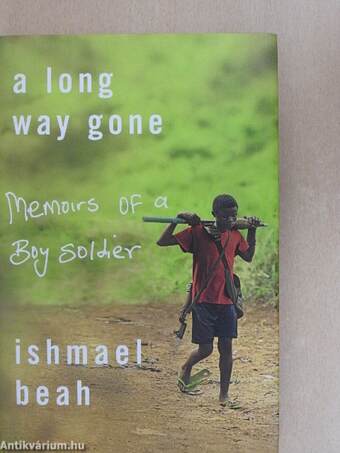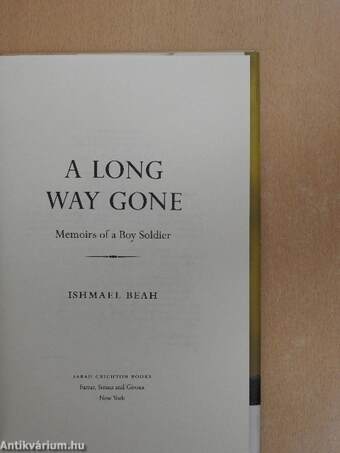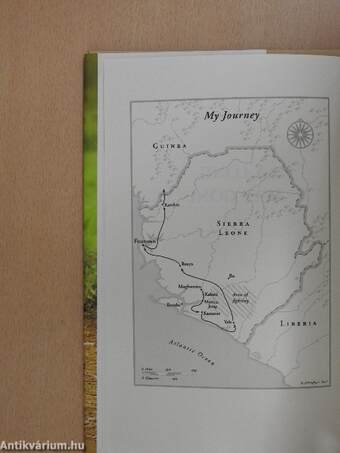1.062.236
kiadvánnyal nyújtjuk Magyarország legnagyobb antikvár könyv-kínálatát

VISSZA
A TETEJÉRE
JAVASLATOKÉszre-
vételek
A Long Way Gone
Memoirs of a Boy Soldier
| Kiadó: | Farrar, Straus & Giroux |
|---|---|
| Kiadás helye: | New York |
| Kiadás éve: | |
| Kötés típusa: | Ragasztott kemény papírkötés |
| Oldalszám: | 229 oldal |
| Sorozatcím: | Sarah Crichton Books |
| Kötetszám: | |
| Nyelv: | Angol |
| Méret: | 22 cm x 15 cm |
| ISBN: | 978-0-374-10523-5 |
| Megjegyzés: | Egy fekete-fehér térképpel. |
naponta értesítjük a beérkező friss
kiadványokról
naponta értesítjük a beérkező friss
kiadványokról
Előszó
1
There were all kinds of stories told about the war that made it sound as if it was happening in a faraway and different land. It wasn't until refugees started passing through our town that we... Tovább
Előszó
1
There were all kinds of stories told about the war that made it sound as if it was happening in a faraway and different land. It wasn't until refugees started passing through our town that we began to see that it was actually taking place in our country. Families who had walked hundreds of miles told how relatives had been killed and their houses burned. Some people felt sorry for them and offered them places to stay, but most of the refugees refused, because they said the war would eventually reach our town. The children of these families wouldn't look at us, and they jumped at the sound of chopping wood or as stones landed on the tin roofs flung by children hunting birds with slingshots. The adults among these children from the war zones would be lost in their thoughts during conversations with the elders of my town. Apart from their fatigue and malnourishment, it was evident they had seen something that plagued their minds, something that we would refuse to accept if they told us all of it. At times I thought that some of the stories the passersby told were exaggerated. The only wars I knew of were those that I had read about in books or seen in movies such as Rambo: First Blood, and the one in neighboring Liberia that I Vissza
Fülszöveg
My high school friends in New York City have begun to suspect I haven't told them the full story of my life. "Why did you leave Sierra Leone?" "Because there is a war " "Did you witness some of the fighting?" "Everyone in the country did." "You mean you saw people running around with guns and shooting each other?" "Yes, all the time." "Cool." I smile a little.
"You should tell us about it sometime." "Yes, sometime."
THIS IS HOW WARS ARE FOUGHT NOW:
by children, traumatized, hopped-up on drugs, and wielding AK-47s. Children have become the soldiers of choice. In the more than fifty violent conflicts going on worldwide, it is estimated that there are some 300,000 child soldiers. Ishmael Beah used to be one of them.
What does war look like through the eyes of a child soldier? How does one become a killer? How does one stop? Child soldiers have been profiled by journalists, and novelists have struggled to imagine their lives. But it is rare to find a first-person account from... Tovább
Fülszöveg
My high school friends in New York City have begun to suspect I haven't told them the full story of my life. "Why did you leave Sierra Leone?" "Because there is a war " "Did you witness some of the fighting?" "Everyone in the country did." "You mean you saw people running around with guns and shooting each other?" "Yes, all the time." "Cool." I smile a little.
"You should tell us about it sometime." "Yes, sometime."
THIS IS HOW WARS ARE FOUGHT NOW:
by children, traumatized, hopped-up on drugs, and wielding AK-47s. Children have become the soldiers of choice. In the more than fifty violent conflicts going on worldwide, it is estimated that there are some 300,000 child soldiers. Ishmael Beah used to be one of them.
What does war look like through the eyes of a child soldier? How does one become a killer? How does one stop? Child soldiers have been profiled by journalists, and novelists have struggled to imagine their lives. But it is rare to find a first-person account from someone who endured this hell and suivived.
In A Long Way Gone: Memoirs of a Boy Soldier, Ishmael Beah, now twenty-six years old, tells a powerfully gripping story: At the age of twelve, he fled attacking rebels and wandered a land rendered unrecognizable by violence. By thirteen, he'd been picked up by the government army, and Beah, at
(continued from front flap)
heart a gentle boy, found that he was capable of truly terrible acts. At sixteen, he was removed from fighting by UNICEF, and through the help of the staff at his rehabilitation center, he learned how to forgive himself, to regain his humanity, and, finally, to heal.
This is an extraordinary and mesmerizing account, told with real literary force and heartbreaking honesty. Vissza
Témakörök
- Idegennyelv > Idegennyelvű könyvek > Angol > Szépirodalom > Megtörtént bűnügyek, dokumentumregények
- Idegennyelv > Idegennyelvű könyvek > Angol > Szépirodalom > Regény, novella, elbeszélés
- Szépirodalom > Regény, novella, elbeszélés > Az író származása szerint > Afrika > Sierra Leone
- Szépirodalom > Regény, novella, elbeszélés > Tartalom szerint > Földrajzi besorolások > Afrika
- Szépirodalom > Regény, novella, elbeszélés > Tartalom szerint > Gyerektörténetek
- Szépirodalom > Regény, novella, elbeszélés > Tartalom szerint > Történelmi regények > Legújabb kor > Egyéb
- Szépirodalom > Regény, novella, elbeszélés > Tartalom szerint > Életrajzi regények > Önéletrajzok, naplók, memoárok
- Szépirodalom > Regény, novella, elbeszélés > Tartalom szerint > Háborús történetek
- Szépirodalom > Megtörtént bűnügyek, dokumentumregények
Ishmael Beah
Ishmael Beah műveinek az Antikvarium.hu-n kapható vagy előjegyezhető listáját itt tekintheti meg: Ishmael Beah könyvek, művekMegvásárolható példányok
Nincs megvásárolható példány
A könyv összes megrendelhető példánya elfogyott. Ha kívánja, előjegyezheti a könyvet, és amint a könyv egy újabb példánya elérhető lesz, értesítjük.







